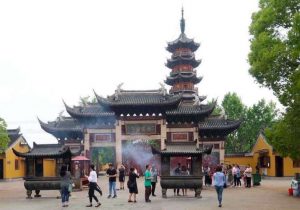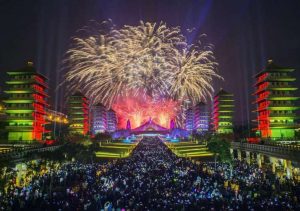
One of the questions of asked of me during meditation retreats at Guang Jue Temple is: “Did Amitabha Buddha really exist?” This question is most often followed by “Is the Pure Land a real place?”
By all means these two questions are very important ones posed by aspiring Pure Land practitioners. Both questions place us directly in front of the door of the transcendental nature of Pure Land Buddhism. All that the retreat guest really wanted to do was come away for a quiet week end and learn some relaxing meditation, leave one’s cares behind and learn how to live a better life according to Pure Land Practice. Now they are about to do mental gymnastics through the loops of the dizzy heights of transcendentalism! What does all this mean to the aspiring seeker?
Firstly I am often intrigued by the words “real” and “really”. Both words imply a ‘truth’ and an ‘untruth’. However, as we are aware Truth is like a large elephant being groped by a group of blind people all trying to ascertain what this creature is! What is true today with our limited worldly knowledge may not be true tomorrow. It was not long ago in world history that it was considered truth that the world was flat. Today with sophisticated satellites we know differently. We often use the word “real” to describe something tangible, something that can be grasped, something which is not imagined. I find this very interesting as within the same breath we can pursue things which we “imagine” will bring “real” happiness and at the end of the day leave us in misery. The line between real and imagined is often pencil thin. The notion of “real” in addition often has a sense of permanence to it. The phenomenal world is in a state of constant change. Things that are here today may be gone tomorrow; that does not mean they were not real. Our emotions are in a constant state of change. One day we can describe ourselves as being really happy and the next sad and depressed. What is real is only that the mind imagines it so.
The Buddha reminds us of the constant change of all things which highlights their void and substanceless nature. He moves us from the world of empirical experience to the world of non-experience, the world of suffering and impermanence to a world of Nirvana, an absence of suffering and pain. Non-experience does not mean no-experience. I may not have had an experience of riding in a helicopter but that does not mean to say that this experience does not exist.
It is not a question of reality versus non-reality but rather a question of whether we have the capacity to even discern the difference between the two. It is further remarkable that in the Sutra of Visualizing the Buddha of Immeasurable Length of Life the Buddha frequently refers to the laws of Sorrow, of Transitoriness and of Unreality being taught in the Pure Land, the very place which seems to us to be unreal. An unreal place teaching unreality! The Buddha comes to the fact of the matter very swiftly when in the sutra he speaks to the queen Vaidehi and says: “You are still a worldly person, so you cannot concentrate your mind properly.” How can we even begin to comprehend the Buddhist reality when our minds are so clouded by attachment and ego consciousness? We are like people walking in the thick fog and declaring that there is nothing before us. That which we comprehend as reality is marked with the stamp of impermanence. Far from being a place of unreality the Pure Land takes us to the very heart of the nature of all things. The fantastic description of this utopic wonderland pushes our limited minds right into a corner with no place to escape except to look squarely at a reality that supersedes our limited life and thoughts.
To fully understand the Pure Land and Amidha Buddha we must develop a different mindset. The Buddha refers to this mindset as the Three Minds. The Mind of Sincerity, the Mind of Faith and the Mind of Vows.
The Mind of Sincerity is the mind that also knows fear. This is the fear of retrogression into the quagmire of suffering. The Sincere Mind is the Bodhi Mind, a mind of compassion firmly resolved to transcend suffering and to help all sentient beings to do likewise. The Mind of Faith is the mind that has set its course to the practice and directly experienced the fruits of the practice. As a result the mind is has an experiential-knowledge-faith. The Mind of Vows is the mind that is single mindedly motivated towards its goal of ceasing the cycle of birth, death and suffering. These three minds assist us to begin to experience a new reality. In this temporal world Pure Land is indeed an experiential phenomenon. In our Pure Land practice we begin to shift from mere intellectualization to an experience. So while the transcendent concepts of Pure Land challenge us they do so by painting us into a corner, so-to-speak, so that the way through is by direct experience and through the direct experience comes the heart-knowledge.
There is nothing like a good death confrontation to awaken us. This is precisely the situation that Queen Vaidehi and her husband king were in as told in the Sutra of the Visualization of the Buddha of Immeasurable Light from which our Pure Land practice evolves. In such a confrontation we do not have the luxury of time to intellectualize on the transcendent nature of things. Queen Vaidehi was desperate for an answer to why she was in the situation she was in and desperate to transcend it at the same time. The Buddha chose not to go into lengthy explanations. He chose to show her the way. She had a solid faith in the Buddha’s teaching. She was certainly motivated in vow to attain ultimate bliss and she made the maximum of the time for profound practice. As a result she experienced transcendence and found freedom of mind and peace of soul. Is this not what we are searching for? Of course it is! But our ego nature screams out. Our ego nature tells us what we want to feel good. Our ego nature is not satisfied with the intangible. It wants arguments so it can pretend to be “right”. So it analyzes and becomes entangled in over-thinking. When we over-think, we under-do. Analyzing is only a form of procrastination, a habit of the ego which really only prolongs our suffering. The Buddha was aware of this. That is in the Sutra of the Visualization of the Buddha of Immeasurable Light he expounds a profound practice. The Mystery of the Pure Land in its transcendental form can only be by walking hand-in-hand with the business of deep and sincere practice. In this we will truly find the Land of Ultimate Bliss in this lifetime.






